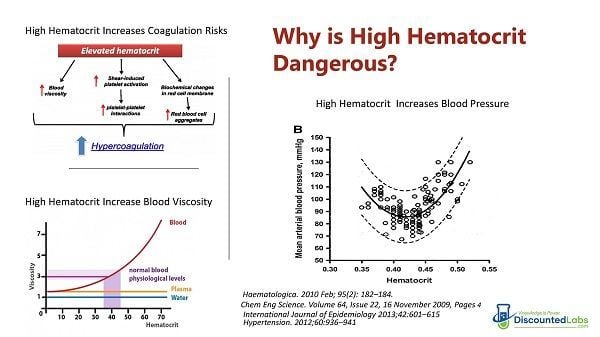Nelson Vergel
Founder, ExcelMale.com
Debunking the Myth About High Hematocrit in Men on TRT
I know many of you want to feel reassured that managing hematocrit isn’t necessary. However, misinformation is spreading, with some "bro science" videos and even a few so-called expert doctors claiming that men on TRT don’t need to worry about elevated hematocrit because people living at high altitudes have high hematocrit without increased mortality.
Let’s set the record straight—again.
High hematocrit in men on TRT is NOT the same as high hematocrit in people living at high altitudes. These are two completely different physiological conditions. Here’s why:
- TRT Increases Both Hematocrit and Blood Volume
- Testosterone stimulates red blood cell production, raising hematocrit.
- It also increases blood volume due to sodium retention and other factors.
- This combination can contribute to increased blood viscosity, which raises cardiovascular risk.
- People at High Altitudes Experience Different Physiological Adaptations
- At high altitudes, lower oxygen availability triggers an increase in red blood cell production to compensate.
- However, these individuals do not experience the same increase in blood volume that men on TRT do.
- Additionally, hypoxia (low oxygen levels) promotes blood vessel dilation, helping maintain proper circulation despite increased hematocrit.
A key paper on altitude physiology states:
"To compensate for the low partial pressure of oxygen at altitude, the body undergoes physiological changes, including increased circulating hemoglobin. However, there is also a fall in plasma volume, increasing hemoglobin concentration in the early stages of hypoxic exposure."
The crucial difference? Men on TRT experience increased blood viscosity due to both higher hematocrit AND increased blood volume, while high-altitude dwellers do not.
The Data on TRT, High Hematocrit, and Cardiovascular Risk
Real-world evidence is already showing that elevated hematocrit in men on TRT is linked to a higher risk of cardiovascular events. For example:
Rises in Hematocrit Are Associated With an Increased Risk of Major Adverse Cardiovascular Events in Men Starting Testosterone Therapy: A Retrospective Cohort Claims Database Analysis.
This study found a significant correlation between increased hematocrit and cardiovascular risks in men undergoing TRT.
Conclusion
The claim that men on TRT with high hematocrit face no additional health risks because high-altitude residents have high hematocrit is scientifically flawed. These are two different conditions with fundamentally different effects on blood circulation and cardiovascular health.
If you are on TRT and your hematocrit is rising significantly, it is not something to ignore. Proper monitoring and management are essential for long-term health.
People living at high altitudes who have high hematocrit are NOT the same as men on TRT with high hematocrit who live at "normal" altitudes. Why?
TRT increases red blood cells/hematocrit AND blood volume (due to sodium retention and other factors) AND blood pressure (depending on the patient). People at high altitudes (and not on TRT) are exposed to lower atmospheric partial pressures, which increases dilation of blood vessels. These people also do not experience increased blood volume even with higher red blood cells/hematocrit.
"In order to compensate for the low partial pressure of oxygen at altitude, the human body undergoes a number of physiological changes. A vital component in this process is the increase in the concentration of circulating hemoglobin. The role of HIF-1alpha, erythropoietin and red blood cells in this acclimatization process is described, together with the fall in plasma volume that increases the concentration of hemoglobin in the early stages of hypoxic exposure."
Difference between these people and men on TRT: We have increased blood volume and hemoglobin/hematocrit.
Full paper: Heights and haematology: the story of haemoglobin at altitude
We already are gathering data on higher mortality in men on TRT who have high hematocrit:
Rises in Hematocrit Are Associated With an Increased Risk of Major Adverse Cardiovascular Events in Men Starting Testosterone Therapy: A Retrospective Cohort Claims Database Analysis
Last edited:
















